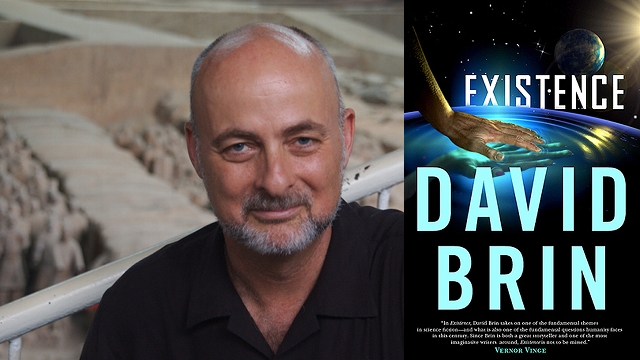It is, of course, wise and beneficial to peer ahead for potential dangers and problems — one of the central tasks of high-end science fiction. Alas, detecting that a danger lurks is easier than prescribing solutions that can prevent it. Take the plausibility of malignant AI, remarked-upon recently by luminaries ranging from Stephen Hawking to Elon Musk. Indeed, my own novels contain some chilling warnings about failure modes with our new, cybernetic children.
It is one thing to yell at dangers. Alas, it is quite another when it comes to offering pragmatic fixes. There is a tendency to offer the same prescriptions, over and over again:
1) Renunciation: we must step back from innovation in AI (or other problematic tech). This might work in a despotism… indeed, 99%+ of human societies were highly conservative and skeptical of “innovation.” (Except when it came to weaponry.) Our own civilization is tempted by renunciation, especially at the more radical political wings. But it seems doubtful we’ll choose that path without be driven to it by some awful trauma.
2) Tight regulation. There are proposals to closely monitor bio, nano and cyber developments so that they – for example – only use a restricted range of raw materials that can be cut off, thus staunching any runaway reproduction. Again, it won’t happen short of trauma.
3) Fierce internal programming: limiting the number of times a nanomachine may reproduce, for example. Or imbuing robotic minds with Isaac Asimov’s famous “Three Laws of Robotics.” Good luck forcing companies and nations to put in the effort required. And in the end, smart AIs will still become lawyers.
All of these approaches suffer severe flaws for one reason above all others. Because they ignore nature, which has been down these paths before. Nature has suffered runaway reproduction disasters, driven by too-successful life forms, many times. And yet, Earth’s ecosystems recovered. They did it by utilizing a process that applies negative feedback, damping down runaway effects and bringing balance back again. It is the same fundamental process that enabled modern economies to be so productive of new products and services while eliminating a lot of (not all) bad side effects.
It is called Competition.
If you fear a super smart, Skynet level AI getting too clever for us and running out of control, then give it rivals who are just as smart but who have a vested interest in preventing any one AI entity from becoming a would-be God.
It is how the American Founders used constitutional checks and balances to prevent runaway power grabs by our own leaders, for the first time in the history of varied human civilizations. It is how companies prevent market warping monopoly, that is when markets are truly kept flat-open-fair.
Alas, this is a possibility almost never portrayed in Hollywood sci fi – except on the brilliant show Person of Interest – wherein equally brilliant computers stymie each other and this competition winds up saving humanity
The answer is not fewer AI. It is to have more of them! But to make sure they are independent of one another, relatively equal, and incentivized to hold each other accountable. A difficult situation to set up! But we have some experience, already, in our five great competitive arenas: markets, democracy, science, courts and sports.
Perhaps it is time yet again to look at Adam Smith… who despised monopolists and lords and oligarchs far more than he derided socialists. Kings and lords were h “dystopian AI” beings in 99%+ of human societies. A trap that we escaped only by widening the playing field and keeping all those arenas of competition flat-open-fair. So that no one pool of power can ever dominate. (And yes, oligarchs are always conniving to regain feudal power; our job is to stop them, so that the creative dance of flat-open-fair competition can continue.
We’ve managed to do this – barely – time and again. It is a dance that can work. And I believe it might work with AI. Sure the odds are against us, but when has that stopped us?
Oh, one final note about this concept: you can bet that a potent AI will ponder all of those points, especially if it is confronted with them by competitive peers. The fact is that it is a competitive-but-fair civilization that will have made them! And no other kind ever came close. The advantages of flat-fair-regulated competition in creating positive sum games will be blatantly clear to any AI who works through the prisoner’s dilemma. But first he has to FACE the Prisoner’s Dilemma. And that only happens if there is a competitive situation.
(Excerpted from a book in progress…) David Brin — author of The Postman, EARTH, and EXISTENCE
Bio:
David Brin is an astrophysicist whose international best-selling novels include The Postman, Earth, and recently Existence. His nonfiction book about the information age – The Transparent Society – won the Freedom of Speech Award of the American Library Association. His newest book, INSISTENCE OF VISION, is his third collection of short stories. (http://www.davidbrin.com)
* hero image from http://io9.gizmodo.com/5906672/david-brin-on-the-need-to-restore-optimism-to-science-fiction

March 5, 2016 at 5:20 am
Interesting article, unfortunately marred by many grammar and syntax mistakes.
Where is his editor??!
March 7, 2016 at 7:18 pm
given he didn’t have time, and such mistakes are trivial I would not normally even mention it…